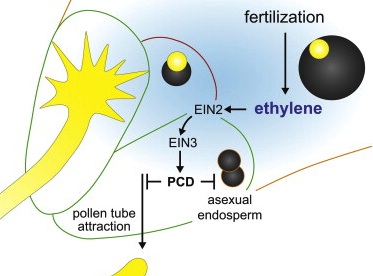Paper of the month (August 2013)
 . .
Ethylene signaling is required for synergid degeneration and the establishment of a pollen tube block
Völz R, Heydlauff J, Ripper D, von Lyncker L, Groß-Hardt R.
Source Center for Plant Molecular Biology (ZMBP), University of Tübingen, 72076 Tübingen, Germany.
Reference: Volz et al (2013) Dev Cell, 25 (3) 310–316.
Summary
In flowering plants, sperm cells are delivered by pollen tubes, which are attracted by two egg-cell-adjoining synergids. Successful fertilization terminates pollen tube attraction; however, the underlying mechanisms are not understood. Here, we show that the process of fertilization activates an EIN3- and EIN2-dependent ethylene-response cascade necessary for synergid cell death and the concomitant establishment of a pollen tube block. Microinjection of the ethylene precursor ACC into the female gametophyte or constitutive ethylene response results in premature synergid disintegration. This indicates that the requirement of fertilization for synergid degeneration and associated establishment of a pollen tube block can be bypassed by mimicking a postfertilization ethylene burst. Surprisingly, the persistent synergid in ethylene-hyposensitive plants adopts the molecular profile and cell-cycle regime of the biparental embryo-nourishing tissue, suggesting that ethylene signaling prevents the formation of an asexual maternal endosperm fraction.
-----------------------------------------------------------------------------
Click here for previously featured paper of the month.
|